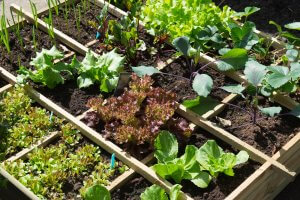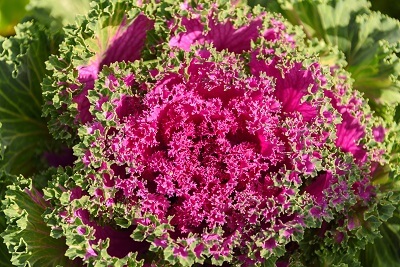Winter Planting: Ways to Reap What You Sow
 If you haven’t already started your winter planting, now is the time to get out there and prepare your garden while the weather is still favourable. Many of your plants slow down their productivity rates as the outside temperatures drop. But, there are hardy survivors that germinate well in cold temperatures. In addition to new planting, there are some essential winter garden chores to be done that will ensure you have a bounty of delicious fruits, vegetables, and herbs, beautiful ornamental trees, and fragrant flowers when winter turns into spring.
If you haven’t already started your winter planting, now is the time to get out there and prepare your garden while the weather is still favourable. Many of your plants slow down their productivity rates as the outside temperatures drop. But, there are hardy survivors that germinate well in cold temperatures. In addition to new planting, there are some essential winter garden chores to be done that will ensure you have a bounty of delicious fruits, vegetables, and herbs, beautiful ornamental trees, and fragrant flowers when winter turns into spring.
The gardening climate zone where you live will help to decide what winter planting chores will produce the best results. Australia has two major climate zones for planting and growing, and they are warm and cold. Perth and the surrounding areas lay within the colder zone where the average winter temperature ranges from the low to mid-teens with mild sunny days. Snows and hard frosts are rare occurrences, but the soil temperatures can be rather cold with 15 degrees C or lower.
WINTER PLANTING IN PERTH
Avoid over-watering whatever you sow during the winter months to eliminate the risk of new seedlings dying in wet, cold soil. Just give any new plants one deep watering and then wait for the plants to break through the ground before any additional watering is needed. One way to ensure that the roots of your plants and trees remain healthy is to turn off your reticulation system in accordance with the June 1st to August 31st winter sprinkler ban.
WHAT SHOULD YOU PLANT IN WINTER?
1. Vegetables, Spices, and Herbs: Artichoke, asparagus, broad beans, broccoli, cabbage, celery, green leafy vegetables such as lettuce, kale, and endive, carrots, cauliflower, chicory, chives, onions, peas, snow peas, spring onions, spinach, strawberries, blueberries, tarragon, thyme, fennel, sage, coriander, garlic, mint, oregano, parsley, tubers such as turnips and potatoes, radishes, rhubarb, silver beets, mizuna, bok choy, and pak choi. Improve your planting soil with Bibra Lake Veggie Mix. If there is another plant or seedling that you are considering for your winter garden, but aren’t sure if they will germinate in your area and in your particular soil conditions; call us at (08) 9434 2290 and talk with one of our Bibra Lake Soil experts.
2. Fruit Trees: Citrus, apple, plum, pear, fig, passionfruit, and nectarines. There are varieties of dwarf and smaller fruit trees that grow well in smaller gardens and in larger pots. One insider tip for growing healthy, lush, bountiful trees is to plant two trees of the same fruit in the same area where cross pollination encourages their growth. Improve the soil for your fruit trees with Mushroom Compost. For questions about the winter planting of other fruit trees, call us at (08) 9434 2290 and talk with one of our winter gardening professionals.
3. Ornamental Trees: Colourful Prunus trees such as the Klara Mayer double pink, the Alboplena double white, and Magnifica double red. Easy to grow Pyrus Glen’s Form Chanticleer and Korean Sun designer pear trees. Prunus Nigra and Blireana are ornamental flowering plum trees. Enhance the nutrients in your soil with this Landscape Mix.

5. Flowers: Accentuate your property with winter flowers such as calendulas, pansies, violas, carnations, snapdragons, alyssums, carnations, marigolds, poppies, begonias, foxgloves, and cornflowers. Add essential nutrients for flower planting with Potting Mix.
WINTER GARDENING CHORES FOR A BLOOMING SPRING
There are some landscaping chores you can during the winter months to revitalise, protect, and beautify your plants and trees before the warm weather returns.
1. Pruning: Winter is the perfect time to prune vines and bushes. There is a smaller chance of stress when the pruning is done during the cooler weather. This foliage makeover invigorates the plants and improves their springtime blossoming phases.
2. Replanting: Dig up, divide, and replant in shady areas, individual sections of your violet ground covering. This protects the violets and keeps their roots from drying out during the winter months.
3. Transplanting: Winter is the time to transplant bushes, shrubs, and bushes. This time of the year helps to avoid heat stress and to maintain soil moisture while your plants, trees, and bushes re-establish their roots. One insider key to a successful transplant is to retain as much of the root system as possible. Transplantation is easier when the soil is enriched with this Soil Conditioner.
4. Protecting against Snails and Slugs: Snail and slug activity can ruin all of your new seedling plantings. One good measure of defense against these pests is to mix in a light amount of Sheep and Cow manure with your planting soil.
5. Weeding: Weeds may have a short life span, but they are prolific at producing more seeds and spreading across your lawns and gardens. Regular mowing helps to keep weeds manageable. But, if your lawn becomes covered in weeds, you may need some professional treatments. For questions about weeding your lawn or garden, call Bibra Lake Soils at (08) 9434 2290 to speak with one of our soil experts.


